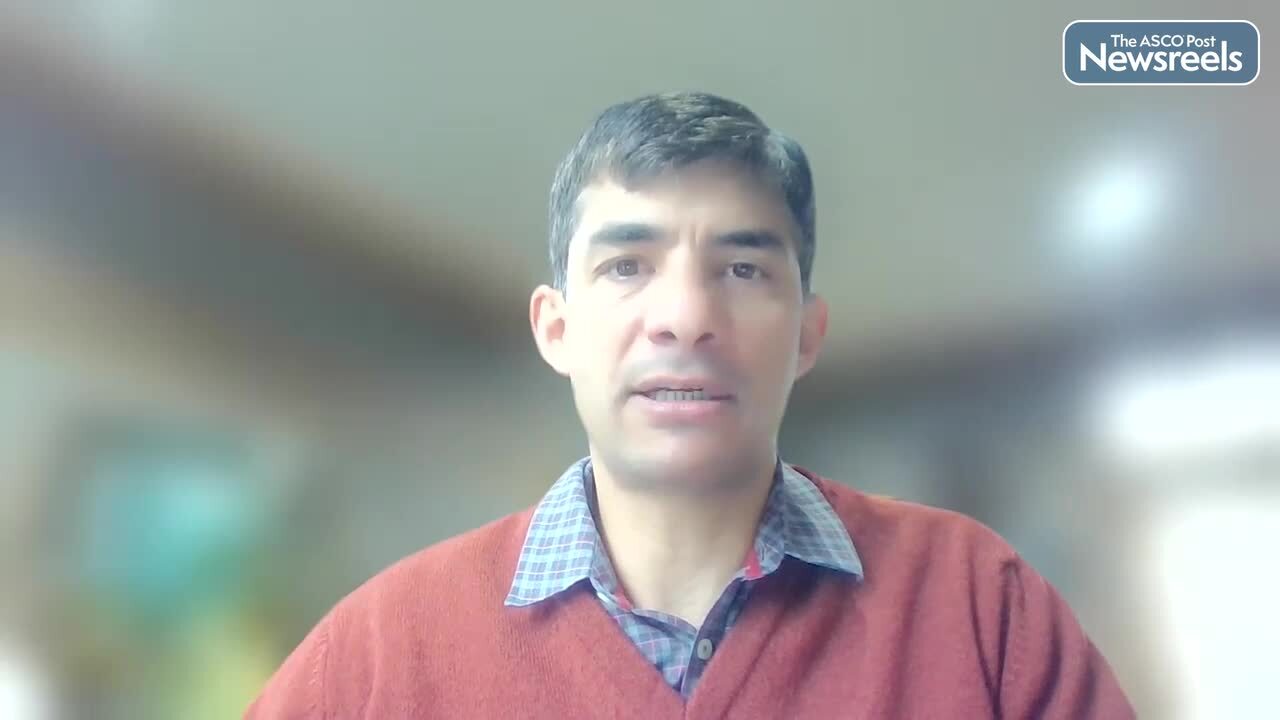Transcript
Disclaimer: This video transcript has not been proofread or edited and may contain errors.
Tycel J. Phillips, MD:
What led you guys to investigate whether omission of radiation was possible?
Emanuele Zucca, MD:
The first issue to keep in mind is that primary mediastinal large cell lymphoma is a totally separate and particular entity which is affecting younger people in their 30 and 40 years of age, mainly white women but not just them, and is presenting with a bulky chest mass. And at the end of induction immunochemotherapy, nearly all the patient still have a residual lesion in the chest. And the fact that patient with earlier relapse or not rapid remission had this malprognosis led many investigative doctors to give to everybody consolidation radiotherapy to the mediastinal after induction immunochemotherapy. And this is increasing the risk of second cancer and delayed cardiac toxicity, both valvular and ischemic cardiac disease. This was the first part of the story.
Second part is that roughly 15, 20 years ago at the NIH has been developed a regimen called dose-adjusted EPOCH-R, which was quite promising in this disease. And there were data indicating that perhaps radiotherapy was no longer needed for patients responding to immunochemotherapy. This led actually to a never-ending controversy and there are people and many countries where radiotherapy has remained in the standard, for example, in Italy or in Germany, and others, for example, just to stay in Europe, in France where radiotherapy was no longer used. And-
Tycel J. Phillips, MD:
That's a very good-
Emanuele Zucca, MD:
... and this prompted us to design a study to address this controversy.
Tycel J. Phillips, MD:
No, no, that's a very, very good point. I mean, because I think as you pointed out with dose-adjusted EPOCH, I think a lot of us US investigators prefer that regimen over the ability to hopefully omit radiation, whereas we almost felt obligated with R-CHOP, so I think your study will add a lot of context to that controversy.
Emanuele Zucca, MD:
Yes. First, our study has a byproduct to show that standard R-CHOP given every three weeks is likely inferior to the more aggressive dose-enhanced regimens including EPOCH-R. But the main result of the study is that we can actually spare radiotherapy to the people achieving a metabolic complete response after immunochemotherapy.
Tycel J. Phillips, MD:
And that's any immunochemotherapy, correct?
Emanuele Zucca, MD:
Yes.
Tycel J. Phillips, MD:
Okay.
Emanuele Zucca, MD:
The point is that they have with PET scan a residual uptake in the residual lesions which has to be below the liver uptake. This is called Deauville score 3 and is indicating a complete metabolic response as well as lower uptakes, which are Deauville score of 1 or 2. And patients achieving a metabolic response on PET scan do not need radiotherapy according to our results. There is a very tiny benefit of radiotherapy, around at 2%, which is not translating in any superiority of overall survival. Patients achieving a complete remission at three years after study entry had 99% survival rates irrespectively of whether they got or not radiotherapy.
Tycel J. Phillips, MD:
That's excellent. So I think as you pointed out very clearly, it's very important to know that even if the patients actually got R-CHOP and went into remission, that you could safely omit radiotherapy if they were PET negative.
Emanuele Zucca, MD:
Yes.
Tycel J. Phillips, MD:
So what are the next steps for this study as it matures?
Emanuele Zucca, MD:
Which was somehow surprising us during the study was that we had a very low rate of events. However, the rate of complete remission by PET at the end of immunochemotherapy was only about 50%. So I am expecting that there is a portion of patients with partial remission in this PET scan evaluation who are actually with no longer active tumor, but just is a problem of very high sensitivity of modern PET scans. And for this reason, we will investigate whether we can use liquid biopsy to see whether a partial response is in need of additional radiotherapy or not. That is what we are discussing for the future.
Tycel J. Phillips, MD:
No, that would be actually a phenomenal study to do, because I think we've all seen areas with partial responses, especially with PET scans and areas that we can't reach and sort of question whether that's actually true responses, so to be able correlate that with liquid biopsies would be a monumental step forward for all of us to better understand these diseases. I think overall, I mean I think this contribution of this abstract is very helpful for, as you already mentioned, a very young patient population.
One last question before we wrap up. As far as the side effect profile, have you guys noticed anything in the short term in the group that was randomized to radiation versus those that did not get radiation?
Emanuele Zucca, MD:
There is no data indicating that there is a subset of patients who are likely experiencing a different outcome. I think that the study has a very simple take-home message, which is no radiotherapy for those in complete remission, and also, thus far it is too early for addressing delayed toxicity, but [inaudible 00:06:49] we had six serious events with three serious cardiac events and three second cancers, all of them in the radiation therapy arm.
Tycel J. Phillips, MD:
Interesting.
Emanuele Zucca, MD:
Which is supporting even more the study results.
Tycel J. Phillips, MD:
No, I agree. Thank you. Great study, great presentation. And I look forward to further maturation of the study data. I'm assuming we all do and I appreciate you taking the time to talk to me this afternoon.
Emanuele Zucca, MD:
It was nice to meet you.
Tycel J. Phillips, MD:
Yeah, thank you.
Emanuele Zucca, MD:
Bye.





